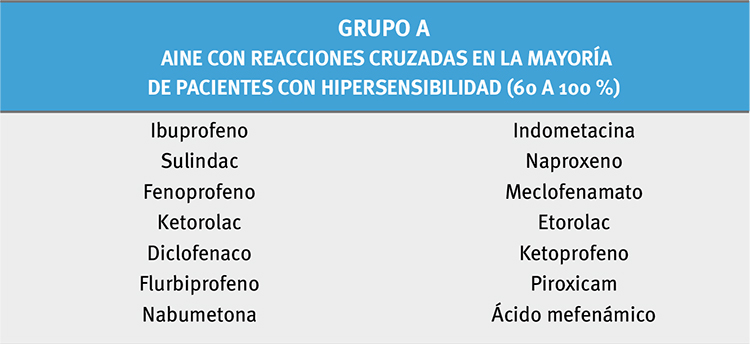Tolerance to cilooxigenase 2 selective inhibitors in patients with non steroidal anti-inflammatory drug sensitivity: experience in a center
DOI:
https://doi.org/10.29176/2590843X.233Keywords:
NSAID sensitivity, shortened oral drug challenge, COX-2 selective inhibitors, meloxicam, etoricoxib, re-challengeAbstract
Background: Patients with non-steroidal anti-inflammatory drugs (NSAID) sensitivity have a low prevalence of cross-reaction to COX-2 selective inhibitors. Oral drug challenge with these agents can be done in a clinical setting with a good safety profile.
Objective: To evaluate tolerance to COX-2 selective inhibitors in patients with history of NSAID sensitivity using a shortened oral drug challenge.
Methods: Patients with NSAID sensitivity were included. A shortened oral drug challenge with a COX-2 selective inhibitor (meloxicam or etoricoxib) was carried out. The challenge was considered positive if any of the following symptoms appeared: urticaria, rhinoconjunctivitis, angioedema, anaphylaxis or bronchospasm, the latter defined as a fall in FEV1 equal or greater than 20%.
Results: Fifty-four patients were enrolled (78% were women), with a mean age of 39.6 years (range, 13 to 70 years). Forty three patients were challenged with meloxicam (79.6%) and 11 with etoricoxib (20.4%). Forty nine patients tolerated the drug challenge (90.7%), and only five patients (all challenged with meloxicam) developed a reaction (9.3%): urticaria in two, urticaria plus angioedema in one, and broncospasm in other two. From these, three were rechallenged with etoricoxib and all of them tolerated it.
Conclusion: Most of the subjects with NSAID sensitivity tolerated a COX-2 selective inhibitor by means of a shortened oral drug challenge. This is the first cohort of patients with NSAID sensitivity and its tolerance to COX-2 selective inhibitors published in our country.
Author Biographies
Eduardo Echeverry
Médico Internista. Servicio de Medicina Interna, Fundación Valle del Lili, Cali, Colombia
Carlos Serrano
Médico Internista. Servicio de Medicina Interna, Fundación Valle del Lili, Cali, Colombia
Médico Internista-Alergólogo. Unidad de Alergia, Fundación Valle del Lili, Cali, Colombia
References
2. Valero A, Picado C. Asma e idiosincrasia a anti-inflamatorios no esteroideos. En: Quirce S, Carrillo T, Olaguibel J, editores. Asma (II). Madrid: MRA Editores; 2005. p. 143-60.
3. Serhan CN, Oliw E. Unorthodox routes to prostanoid formation; new twists in cyclooxygenase-initiated pathways. J Clin Invest. 2001;107:1481-9.
4. Capra V. Molecular and functional aspects of human cysteinyl leukotrienes receptor. Pharmacol Res. 2004;50:1-11.
5. Sánchez-Borges M, Capriles-Hulett A, Caballero-Fonseca F, Ramon-Perez C. Tolerability to new COX-2 inhibitors in NSAIDsensitive patients with cutaneous reactions. Ann Allergy Asthma Immunol. 2001;87:201-4.
6. Stevenson DD, Hougham A, Schrank P, Gldlust MB, Wilson RR. Salsalate cross-sensitivity in aspirin-sensitive asthmatics. J Allergy Clin Immunol. 1990;86:749-58.
7. Szczeklik A, Niziankowska E, Duplaga M. Natural history of aspirin-induced asthma. Eur Respir J. 2000;16:432-6.
8. Melillo G, Balzano G, Bianco S, Dahlén B, Godard P, Kowalsky ML, et al. Oral and inhalation tests for the diagnosis of aspirininduced asthma. Allergy. 2001;56:899-911.
9. Valero A, Baltasar M, Enrique E, Pau L, Dordal T, Cisteró A, et al. NSAID-sensitive patients tolerate rofecoxib. Allergy. 2002;57:1214-5.
10. Göksel O, Aydin O, Misirligil Z, Demirel YS, Bavbek S. Safety of meloxicam in patients with aspirin/non-steroidal anti-inflammatory drug-induced urticaria and angioedema. J Dermatol. 2010;37:973-9.
11. Viñas M, Castillo MJ, Dordal MT, Serra R, Martí E. Meloxicam tolerance in hypersensitivity to nonsteroidal anti-Inflammatory drugs. J Investig Allergol Clin Immunol. 2006;16:364-6.
12. Weberschock TB, Monina-Müller S, Boehncke S, Boehncke WH. Tolerance to coxibs in patients with intolerance to non-steroidal anti-inflammatory drugs (NSAIDs): A systematic structured review of the literature. Arch Dermatol Res. 2007;299:169-75.
13. Kowalski ML, Makowska JS, Blanca M, Bavbek S, Bochenek G, Bousquet J, et al. Hypersensitivity to nonsteroidal anti-inflammatory drugs (NSAIDs): Classification, diagnosis and management. Review of the EAACI/ENDA and GA2LEN/HANNA. Allergy. 2011;66:818-29.
14. Sánchez-Borges M, Caballero-Fonseca F, Capriles-Hulett A. Safety of etoricoxib, a new cyclooxygenase 2 inhibitor, in patients with nonsteroidal anti-inflammatory drug-induced urticaria and angioedema. Ann Allergy Asthma Immunol. 2005;95:154-8.
How to Cite
Downloads

Downloads
Published
How to Cite
Issue
Section

| Article metrics | |
|---|---|
| Abstract views | |
| Galley vies | |
| PDF Views | |
| HTML views | |
| Other views | |






